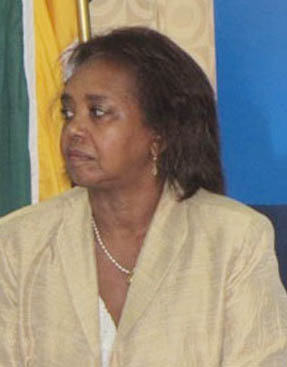UNDP Resident Represen-tative and UN Resident Coordinator Khadija Musa says co-operatives should re-examine the role of youth in supporting food security ventures.
Speaking at a Guyana National Cooperative Credit Union Limited (GNCCUL) forum convened last week to review and advance the movement, Musa said co-operatives ought to review the role of youth not only within the co-operative system but in farming societies. She also advised that the movement tap into the hinterland and support budding groups venturing into enterprise especially in Amerindian communities, according to a Government Information Agency (GINA) report.

“We really need to bring back the pride of cultivating and producing and packaging and educating to learn more and appreciate more about what the earth offers as we create confidence in them and encourage them and empower them not only to focus to become a bureaucrat in an office but also to become the vehicle to food security,” she said.
In 2012, UNDP and the Guyana Government signed an agreement for the release of financing for the Amerindian Development Fund (ADF) through which an initial $360 million is to be made available for the commencement of Community Development Plans (CDPs) in Amerindian communities.
The objectives of the projects are to generate income to enhance livelihoods in the villages. Musa said almost 50% of these CDPs are agriculture ventures and co-ops can play a crucial role in this area by providing these budding community groups with the support to help them meet the market and in sustaining the ventures. As such, she posited that the movement provides support to hinterland groups venturing into enterprise.
The UN representative also called for the strengthening of social cooperatives’ responsibility particularly in engaging assistance to build up an organisation of cooperatives where there is partnership for development. It is in this line, she said, that UNDP will be facilitating during this year with its support office in Turkey, a training session to address how collaboration can occur with cooperative organisations and businesses in going forward.
Meanwhile, Labour Minister Dr Nanda Gopaul said that government will intervene to prevent large and wealthy entrepreneurs from influencing land change in the co-operative movement.
“I have responsibility to the cooperative movement and a responsibility to ensure fairness and to ensure people’s lands are not taken away and members are not unjustifiably disenfranchised,” the minister said. He also revealed that he had already had cause to intervene in such matters on two occasions; however, he said government is committed to ensuring that people’s interests are preserved.
“There is a bright future for the cooperative movement and it is in this regard that I believe that if properly supervised and managed we can make a success story and thousands of people will benefit significantly from their involvement in the cooperative movement,” he said. Gopaul also acknowledged that there is much room for improvement and he is optimistic that changes can be implemented based on the members dedication to the movement.
In addition, Chairman, Interim-Management Committee (IMC) GNCUL Derrick Cummings said in moving forward the organisation will advocate engaging partnership with private persons and looking at revamping existing laws.
2012 was designated the International Year of Cooperatives to raise public awareness of the invaluable contribution of cooperative enterprises. Each assigned year draws attention to and encourages action on major issues. Last year, the Ministry of Labour made several interventions that sought to provide guidance to enhance cooperatives. In regard to solving disputes, the ministry appointed and trained several arbitrators, conducted 132 field visits to cooperatives, checked and ratified 297 constitutions of friendly societies and cooperatives reviewed 131 societies and audited a combination of 132 societies and cooperatives. A total of 102 of these audits have since been released.
The ministry also attended 59 AGMs of cooperatives, 215 with cooperative movement committees, 7 cooperative stakeholder meetings, held meetings with 1004 members at the ministry on issues of concerns, held 42 arbitrations among members and conducted 24 inquiries into the cooperative movement.








